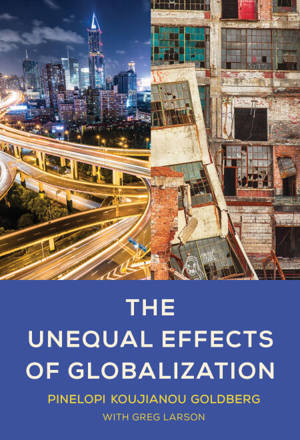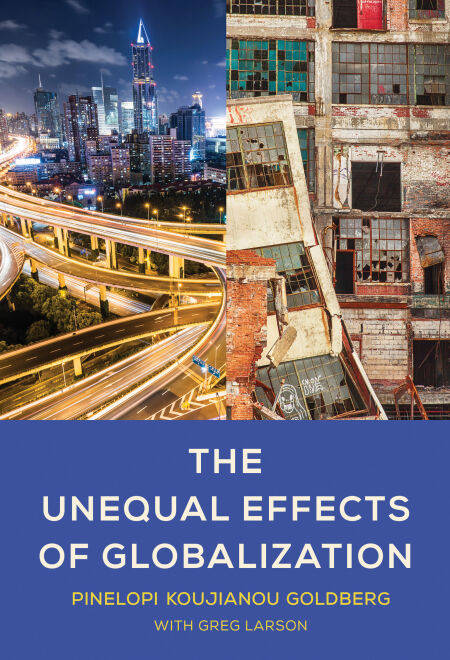
- Afhalen na 1 uur in een winkel met voorraad
- Gratis thuislevering in België vanaf € 30
- Ruim aanbod met 7 miljoen producten
- Afhalen na 1 uur in een winkel met voorraad
- Gratis thuislevering in België vanaf € 30
- Ruim aanbod met 7 miljoen producten
Zoeken
The Unequal Effects of Globalization E-BOOK
Pinelopi Koujianou Goldberg
€ 39,42
+ 39 punten
Uitvoering
Omschrijving
From a former Chief Economist of the World Bank, a brief, balanced, and sobering discussion of globalization trends, their drivers, and effects on inequality.
The recent retreat from globalization has been triggered by a perception that increased competition from global trade is not fair and leads to increased inequality within countries. Is this phenomenon a small hiccup in the overall wave of globalization, or are we at the beginning of a new era of deglobalization? Former Chief Economist of the World Bank Group Pinelopi Koujianou Goldberg tells us that the answer depends on the policy choices we make, and in this book The Unequal Effects of Globalization, she calls for exploring alternative policy approaches including place-based policies, while sustaining international cooperation.
At this critical moment of shifting attitudes toward globalization, The Unequal Effects of Globalization enters the debate while also taking a step back. Goldberg investigates globalization’s many dimensions, disruptions, and complex interactions, from the late twentieth century’s wave of trade liberalizations to the rise of China, the decline of manufacturing in advanced economies, and the recent effects of trade on global poverty, inequality, labor markets, and firm dynamics. From there, Goldberg explores the significance of the recent backlash against and potential retreat from globalization and considers the key policy implications of these trends and emerging dynamics.
As comprehensive as it is well-balanced, The Unequal Effects of Globalization is an essential read on trade and cooperation between nations that will appeal as much to academics and policymakers as it will to general readers who are interested in learning more about this timely subject.
The recent retreat from globalization has been triggered by a perception that increased competition from global trade is not fair and leads to increased inequality within countries. Is this phenomenon a small hiccup in the overall wave of globalization, or are we at the beginning of a new era of deglobalization? Former Chief Economist of the World Bank Group Pinelopi Koujianou Goldberg tells us that the answer depends on the policy choices we make, and in this book The Unequal Effects of Globalization, she calls for exploring alternative policy approaches including place-based policies, while sustaining international cooperation.
At this critical moment of shifting attitudes toward globalization, The Unequal Effects of Globalization enters the debate while also taking a step back. Goldberg investigates globalization’s many dimensions, disruptions, and complex interactions, from the late twentieth century’s wave of trade liberalizations to the rise of China, the decline of manufacturing in advanced economies, and the recent effects of trade on global poverty, inequality, labor markets, and firm dynamics. From there, Goldberg explores the significance of the recent backlash against and potential retreat from globalization and considers the key policy implications of these trends and emerging dynamics.
As comprehensive as it is well-balanced, The Unequal Effects of Globalization is an essential read on trade and cooperation between nations that will appeal as much to academics and policymakers as it will to general readers who are interested in learning more about this timely subject.
Specificaties
Betrokkenen
- Auteur(s):
- Uitgeverij:
Inhoud
- Aantal bladzijden:
- 128
- Taal:
- Engels
- Reeks:
Eigenschappen
- Productcode (EAN):
- 9780262375573
- Verschijningsdatum:
- 14/08/2023
- Uitvoering:
- E-book
- Beveiligd met:
- Adobe DRM
- Formaat:
- ePub

Alleen bij Standaard Boekhandel
+ 39 punten op je klantenkaart van Standaard Boekhandel
Beoordelingen
We publiceren alleen reviews die voldoen aan de voorwaarden voor reviews. Bekijk onze voorwaarden voor reviews.







